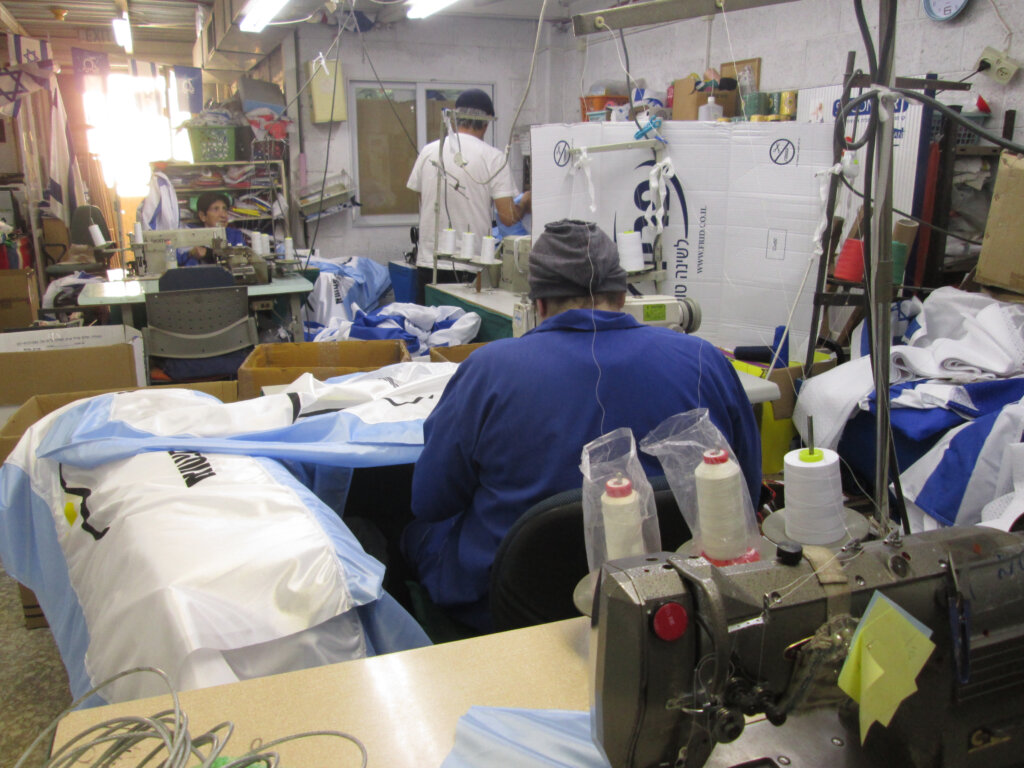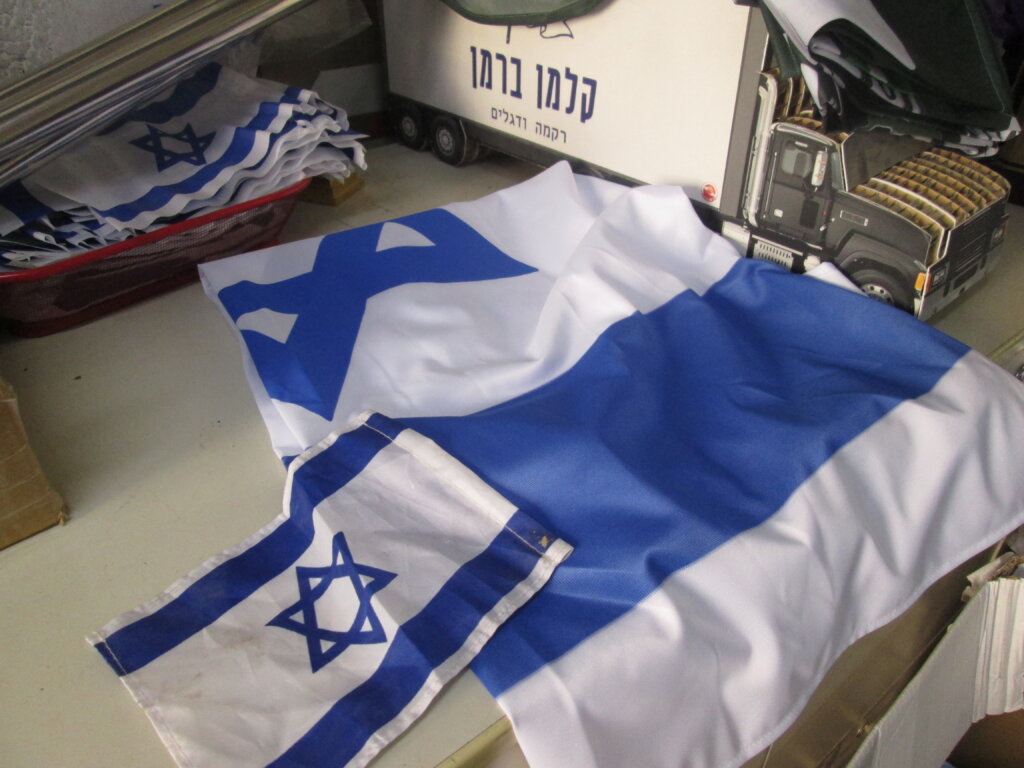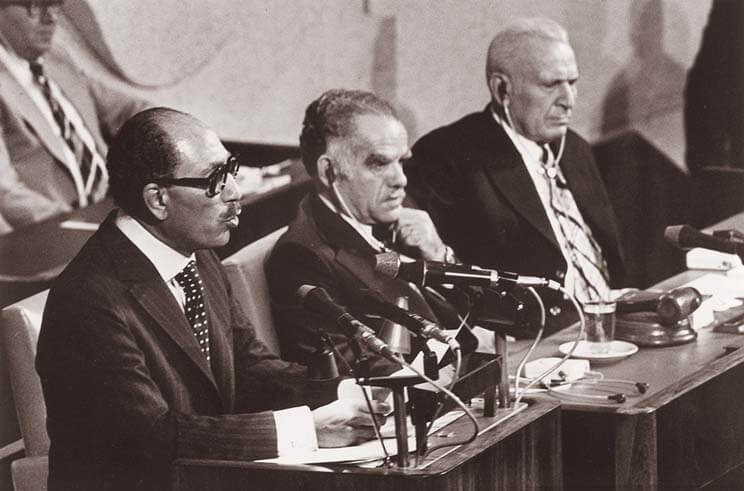Before Israel’s birth, this company began sewing its flags. As Israel turns 75, it’s still in business.
But all those flags in Israel’s streets these days? Not Berman’s

Graphic by Angelie Zaslavsky
JERUSALEM — Hela and Kalman Berman opened a mom-and-pop embroidery business in central Jerusalem in 1944 not long after they fled Poland for British-ruled Palestine to escape the Nazis. Mostly they embellished the dresses of wealthy local Jewish and Arab women, based on Kalman’s drawings.
But in 1947, as Britain began to make plans to quit Mandatory Palestine, and Arab attacks on Jews escalated, the embroidery work dried up. Soon though, the young couple soon gained another, unexpected, source of income that would become the mainstay of their business.

An official from the pre-state Jewish government asked Hela, who was skilled at both embroidery and appliqué, if she could make what a few years later would officially become Israel’s flag. He was so pleased with the result, he ordered many more.
Within a year, Israel was born, and Berman’s Flags and Embroidery grew with the country, providing flags for some of its most historic occasions, including former Egyptian President Anwar Sadat’s 1977 visit to Israel and the signing of the Abraham Accords.
Today, nearly 80 years after its founding, Berman’s is the oldest of Israel’s few flag suppliers. And though the company has remained small, employing no more than 20 employees at its peak, it’s still relied upon by government and other buyers who demand a made-in-Israel flag.
Flags in the streets
This is Berman’s busiest time of year, when a cluster of Israeli holidays — including Yom HaZikaron, dedicated to fallen soldiers, and Yom Ha’atzmaut, Independence Day — are celebrated. In the two months prior to Israel’s birthday — it turns 75 on Tuesday — Berman’s made as many as 30,000 flags, a company employee told American online magazine Israel 21C.
Even when it’s not high season for the Israeli flag, which was designed to invoke a tallit, or Jewish prayer shawl, it’s still the core of a business that also makes the flags of other nations, in addition to sports teams and an array of political parties. Ironically, the very recent surge in flag sales driven by the weekly pro-democracy demonstrations that have brought hundreds of thousands of Israelis into the streets since January hasn’t helped Berman’s, since those flags are largely made in Asia.
“I’ve been to a few demonstrations and I didn’t see a single flag made in Israel,” said Hadassah Berman, the founders’ daughter-in-law, who still helps run the company.
The imports are comparatively flimsy, weigh about a fifth of what a Berman flag weighs and don’t wave as nicely in a breeze, she said during an interview at Berman’s small factory in the Givat Shaul industrial zone of Jerusalem. Most of Berman’s flags are printed, but employees sew the edges, and appliqués. At a customer’s request, a whole flag can be hand-sewn.
“I’m not blaming the protesters,” Berman, 75, said as she placed an imported flag and an Israeli-made one side-by-side. “I’m not sure they were aware that there are flags made in Israel. In Jerusalem.”

A spokesman for the Umbrella Movement, a key organizer of pro-democracy demonstrations, said “people bring whatever flags they have at home.”
Most flags — whether they are made by Berman’s or manufacturers abroad — are of polyester, though nylon and cotton flags are also common. A 3-by-5 foot polyester flag made in China can cost less than $2 online. A similarly sized Berman flag can cost many times that.
Made in Israel
Berman said most of its flags are commissioned by the national government, municipalities, and local organizations.
“Municipalities are all very strict that their flags are made in Israel,” Berman said. “They send inspectors to our factory, to watch our workers sew the flags.”
Today, the company employs eight people — including Hadassah and her son Kalman — who are mostly middle-aged or older. Jewish and Arab workers sit side-by-side, leaning over sewing machines.
“It’s difficult to find people to sew these days. They would rather work in high-tech,” she said with a smile and a shrug.
Even Berman’s late husband, Yitzhak, had other aspirations, but took over the business when his father died.
“It wasn’t his calling, he had other plans, but he had to support his family,” Berman said. “Yet he was very good with people, they liked him a lot, and he was able to expand the business.”

Berman’s doesn’t discriminate in its flag manufacturing. Over the years, the company has created flags of dozens of countries, including several Arab nations that have fraught relations with Israel, as well as the Palestinian Authority. Political parties as diverse as Labor and Likud, and political movements as diametrically opposed as the leftist Peace Now and the right-wing settler group Hebron is Forever, also commission flags.
In the run up to the Independence Day, stores have been filled with imported flags and other items — from paper tablecloths to giant plastic hammers — emblazoned with the Israeli flag. Yet many people turn to Berman’s because of what it represents.
Yishai Fleisher, international spokesman for the Jewish community of Hebron, said he buys the settlement’s flags from Berman’s because they are made in Israel, and because of their employees. “When you go there, you see all kinds of folks working there,” he said. “The flags are made by local people who are part of Israel’s story.”
False flag?
Anticipating Israel’s 75th anniversary, Berman — who was born a few weeks before the founding of the state — waxed nostalgic.
She related how Berman flags took center stage at the signing of Israel’s peace treaties with Egypt and Jordan, and how the company narrowly avoided delivering a flag with an embarrassing mistake.
In 1977, as rumors were flying that Egyptian President Anwar Sadat would make an unprecedented visit to Israel sometime soon, a reporter in the Arabic-language department at Israel Broadcasting News radio advised the Berman’s to quickly manufacture some Egyptian flags.

“The problem was, we didn’t know exactly what the Egyptian flag looks like. This was before the internet,” Berman recalled. But the reporter was a soldier during the ’73 war and took an Egyptian flag as a souvenir, which the company used as a prototype.
Within 48 hours the company created a great many Egyptian flags, only to learn that it had sewn the word “Libya” and not “Egypt,” on them, thanks to the fact that Libya, Syria and Egypt, part of the same confederation, have very similar flags.
Despite the error, the company in record time created thousands of actual Egyptian flags, which wound up decorating the route that then Egyptian President Anwar Sadat took from the airport during his historic 1977 visit to Israel.
Berman recalled how Sadat’s advance team was amazed that the company could produce so many flags within a couple of days.
“They asked, how did you do this?” The answer: “By sleeping on our sewing machines and working until two hours before Shabbat.”
And for the peace treaty with Jordan, Berman’s flags were so admired by a Jordanian prince that he took them home to adorn a palace.
“So we had to quickly start all over again,” Berman said.
But she doesn’t credit the company’s longevity solely to the family and employees that have nurtured the business for nearly eight decades.
“Our parnassa is from God, not us,” the matriarch said, using the Hebrew word for livelihood. “And God is taking good care of us.”





















